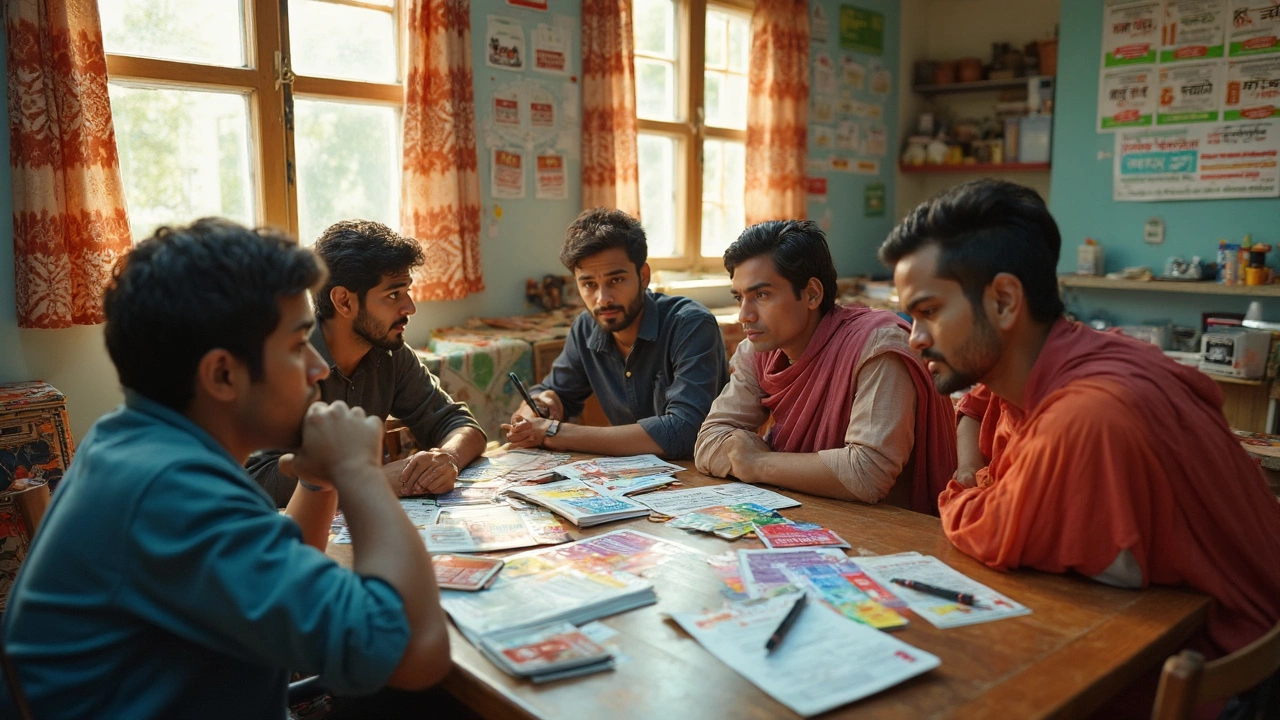Which Government Job Is Best and Easy to Get? Real Answers for 2025
 Apr, 28 2025
Apr, 28 2025
Everyone dreams of a government job—good salary, job security, and those holidays that private guys just envy. But picking the right one? Now that’s tricky. There’s the lure of “best” jobs: think UPSC, SSC CGL, RBI Grade B. But let’s get real—hardly anyone breezes through those without months (or even years) of slogging.
What’s actually easy to get? Honestly, it depends on your background, how much time you have, and how deep your competitive spirit runs. Don’t buy into every coaching center’s claim that every job is within reach. Some genuinely do need less prep or have way fewer applicants. I’m talking about jobs like SSC MTS, Railways Group D, State Clerk posts, or even a few postal department gigs. These aren’t just fillers—they come with regular pay, fixed timings, and nobody expects you to save the world on Day 1.
Before jumping in, think about what “best” even means to you. Is it cash, chill work hours, a nearby posting, or simply cracking a job with the least pain? Don’t let others decide for you. I’ll break down what’s easiest to land, what makes a job ‘best’ (for YOU), and how you can get a leg up on the lakhs of others hunting for a deadline extension every year.
- Understanding 'Best' vs 'Easy' Government Jobs
- Most Accessible Government Jobs in 2025
- Balancing Perks, Pay, and Work Hours
- Preparation Tips that Actually Work
- Reality Checks: Myths, Competition, and Smart Choices
Understanding 'Best' vs 'Easy' Government Jobs
People always ask, "Which government job is the best?" or "Which one is easy to get?"—but those are two totally different questions. The "best" jobs usually give you better pay, a solid career path, and respect. These are jobs like UPSC Civil Services, RBI Grade B, or SSC CGL. But let's be honest, these are tough nuts to crack—lakhs of people apply every year, with selection rates often below 1%.
On the other hand, "easy to get" government jobs usually have a simpler selection process, low competition, or basic eligibility. Think SSC MTS, Railways Group D, or State-level LDC/Clerk jobs. These jobs might not pay the highest or have top-level perks, but cracking the exam is a lot more doable if you start early and stay focused.
Here’s a quick comparison to give you an idea:
| Job Type | "Best" Jobs | "Easy" Jobs |
|---|---|---|
| Examples | UPSC/IAS, RBI Gr. B, SSC CGL | SSC MTS, Railways Gr. D, State Clerks |
| Starting Salary (approx) | ₹50,000+ | ₹18,000–₹25,000 |
| Job Security | High | High |
| Growth/Promotions | Fast, with training | Slower |
| Exam Difficulty | Very tough—advanced level | Easy to moderate—10th/12th/graduate level |
| Competition | Massive | High, but less than "best" jobs |
Picking between "best" and "easy" isn’t about right or wrong. It really comes down to what suits your situation—your age, how ready you are to prepare, your financial needs, or even your wish to stay closer to home. Many real people just want steady work, not a fancy job title. If that’s you, don’t feel pressured to run after the so-called "best" gigs. Focus on jobs you can actually get, prepare right, and stick with the process.
If you’re savvy, you can even start with an "easy" job, gain some experience, and then aim higher later when you have better confidence and a safety net. Plenty of working folks I know cracked a "small" sarkari job, then went for the bigger ones while earning. It’s all about knowing yourself—and playing to your strengths.
Most Accessible Government Jobs in 2025
Not every government job needs you to burn the midnight oil or memorize every GK fact since independence. Some are genuinely easier to grab than others. Here’s what’s popular and practical for 2025:
- SSC MTS (Multi Tasking Staff): The competition is huge, but the syllabus is basic—maths, reasoning, English, and general awareness. Even if you struggled with math in school, these questions aren’t rocket science. As of 2024, over 30 lakh candidates apply, but cutoffs are reasonable compared to CGL and CHSL.
- Railway Group D: The Indian Railways is a giant employer. Group D jobs include track maintenance, porter, and assistant posts. There’s no interview, just an online test. The latest 2024 notification had over 1 lakh vacancies—more than most other exams can dream of.
- State Government Clerk Jobs: States like UP, Rajasthan, and Maharashtra regularly advertise for lower-division clerks. Exams are usually held in native language plus basic math and reasoning. Less pressure, more local postings.
- Post Office (GDS, Postal Assistant): If you have basic computer skills and can manage a written test, GDS (Gramin Dak Sevak) and Postal Assistant jobs are a soft entry. The biggest catch? Selection is mostly merit-based as per your 10th/12th marks, not a brutal written exam for all posts.
Here’s a quick data snapshot for freshers:
| Job Name | Basic Education | Selection Process | No. of Vacancies (Approx. 2024-25) |
|---|---|---|---|
| SSC MTS | 10th Pass | Written CBT | 11,000+ |
| RRB Group D | 10th Pass | Written CBT | 1,00,000+ |
| State Clerk | 12th Pass | Written/Skill Test | Varies by State (few hundred to few thousand) |
| India Post GDS | 10th Pass | Merit Based | 40,000+ |
As one hiring officer from Indian Railways told The Hindu last year,
“Group D and entry-level clerk jobs are the backbone because we need workforce that can quickly adapt, not just toppers who can crack high-level exams.”
So if you’re done with endless attempts at SSC CGL or banking, maybe it’s time to look at these roles. Start with something, gain some experience, and honestly—a steady salary with decent holidays isn’t a bad deal for most of us.

Balancing Perks, Pay, and Work Hours
Let’s break the myth: bigger government jobs aren’t always chill, and some easy government jobs have more perks than you’d guess. Before you set your heart on a particular post, compare what you actually get day-to-day. Here’s how the main types stack up:
- SSC MTS: Decent pay for entry-level; as of 2025, in-hand is around ₹22,000–24,000 per month. Perks are basic: pension, medical, and good job stability. The best thing? Less work pressure and predictable hours (usually 9-5).
- Railway Group D: Pays close to ₹20,000–22,000 starting out plus overtime if you get lucky. Housing and travel passes are the big draw. You rarely have to sit late—if your shift is over, you’re done for the day.
- Clerk (State/Bank): Bank clerks clear around ₹26,000–30,000 a month after deductions, with perks like medical cover, easy loan access, and leaves. But expect transfers. State clerks have similar pay, a little less hectic, and they often stay in one place.
- Postal Assistant: You’re looking at ₹25,000+ monthly. Stable hours and good housing perks if posted in rural areas. Not much hustle—lots of folks balance side gigs or study for better jobs.
Meanwhile, those going for UPSC or high-profile Grade A jobs get awesome perks—house, car, power trips—but crazy long hours, stress, and transfers to distant places are common. If work-life balance matters to you, scale back a bit.
Here’s a quick look at what you can expect in the most popular government jobs in 2025:
| Job Post | Average Salary (₹/month) | Work Hours | Main Perks |
|---|---|---|---|
| SSC MTS | 22,000 | 9-5, Mon-Sat | Pension, job security |
| Railways Gr. D | 21,000 | Shifts, mostly 8 hours | Travel, housing |
| Bank Clerk | 28,000 | 9-5, some weekends | Loans, medical, job growth |
| Postal Assistant | 25,000 | 8:30-5, Mon-Sat | Housing, stable job |
This should help clear things up. Don’t jump for what “sounds” best. If you need time for family (or to walk your dog like I do with Bella every evening), maybe a Railway or Clerk role fits best. Those who want big titles and don’t mind high pressure? Go for the bigger exams. It’s all about what fits your priorities.
Preparation Tips that Actually Work
So, you want a government job that’s actually within reach? Preparation can make or break your chances, but most people waste time doing what everyone else is doing. Here’s what really works.
- Pick Focused Materials: Don’t hoard dozens of guidebooks. Almost every topper says they stick to one main source. For example, Lucent’s GK for static knowledge, a standard Quant book, and last 3 years’ previous papers. That’s it. No rabbit holes.
- Don’t Skip Mock Tests: Timed online mocks are a game-changer. They teach you how to handle the actual pressure and manage your time. In 2024, one big trend was students improving scores by 20% after just five full-length mocks.
- Track Your Weak Points: Don’t just finish a mock and forget about it. List your silly mistakes—especially in SSC MTS or Railways exams where accuracy means everything. Fix those first, then go back for another round.
- Use Free Stuff: So many official sites give sample papers for government job exams. (SSC, RRB, Postal—all have PDFs and answer keys up for grabs.) Print them, solve them, and don’t pay for random Telegram PDFs unless you trust the source.
- Daily Revision, Not Marathons: Study a little bit every day instead of weekend all-nighters. Consistency beats cramming, especially for high-memory things like GK or English vocabulary.
Want some numbers? Here’s how toppers from 2024 cracked the "easy" government jobs:
| Exam | Average Study Hours/Day | Months Needed |
|---|---|---|
| SSC MTS | 3 | 4-6 |
| Railways Group D | 3-4 | 5-7 |
| State Clerk | 2-3 | 3-5 |
Also, join a support group—even if it’s just two friends or an online forum. You get tips, share last-minute news (like exam date changes), and it keeps you motivated when things feel slow. Honestly, you’re not just preparing for a government exam, you’re playing a smart, steady game. Put effort into what gives maximum results—not what everyone else is stressing about.

Reality Checks: Myths, Competition, and Smart Choices
Let’s be brutally honest—there’s way too much hype and loads of half-truths floating around about government job exams. First up: there’s no such thing as a fully “easy” government job just waiting for you. Sure, a few posts have lower cutoffs or less complex exams, but competition is everywhere. Just look at the numbers: SSC MTS had over 30 lakh applicants for about 10,000 seats last year. Does that sound like a cakewalk?
One of the biggest myths is that low-level posts like Railways Group D or clerical roles are a breeze, or you don’t need to study much. That’s just not true anymore. Even for so-called easy government jobs, you need to clear written tests, and sometimes interviews or typing tests. A decent chunk of candidates are repeat exam-takers, so the bar keeps getting higher.
Don’t fall for the idea that coaching is always necessary, either. There are people—my own cousin included—who cracked state government posts with free YouTube playlists, practice mock tests, and zero formal coaching. The key is smart planning, not just slogging for hours or spending big money on prep classes. Use free resources, previous year papers, and official exam notifications as your bible.
| Exam | Applicants (2024) | Vacancies |
|---|---|---|
| SSC MTS | 32 lakh | 11,000 |
| Railways Group D | 1.1 crore | 1,03,769 |
| State Bank Clerk | 17 lakh | 8,828 |
Another thing: don’t jump on the “best sarkari job” bandwagon just because your neighbor or your uncle’s friend landed something that pays more. Think about the trade-offs: pay versus stress, posting location versus family life, desk work versus field duties. If you’re the kind who values free evenings with your dog (shoutout to Bella), then a low-pressure bank or state clerical job might suit you better than some mega-prestige post that eats up your weekends.
- Focus on jobs with fewer application numbers or local recruitment drives—these boost your chances.
- Check actual vacancy numbers before applying, not just the hype.
- Don’t waste months on one tough exam—apply to several, increase your odds.
- Use smart prep: free online mock tests, exam analysis videos, and genuine discussion forums.
If you run behind every trending job post just for its name, you’ll probably burn out. Respect the grind, but be smart: chase jobs that fit your abilities and life goals, not just “what everyone else is doing.” The best government job is the one you actually land—and enjoy showing up for.